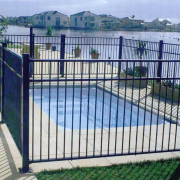The Role of the Pool Safety Barrier in Preventing Homeowner Liability
Owning a pool can be one of the great pleasures of homeownership, offering a refreshing escape during the hot months, a space for relaxation, and a place for family and friends to gather. However, with the enjoyment of pool ownership comes significant responsibility, particularly when it comes to safety. One of the most effective ways to protect yourself, your family, and your guests is by ensuring your pool is equipped with a compliant pool safety barrier.
A well-designed and properly maintained pool safety barrier isn’t just about adhering to local regulations—it’s also about protecting yourself from potential liability in the event of an accident. In this article, we’ll explore the critical role pool safety barriers play in reducing homeowner liability and how they can safeguard your property and peace of mind.
- Understanding Pool Safety Regulations and Liability
Pool safety barriers are mandatory in queensland, with regulations established to prevent young children from accessing the pool unsupervised. These regulations are often set by local governments or national standards to reduce the risk of drowning and injury, especially in residential pools.
However, ensuring that your pool safety barrier complies with local laws isn’t just a legal requirement—it can also be crucial in protecting you from liability. As a homeowner, you could be held responsible if someone—especially a child—were to access your pool without permission and suffer harm. In such a scenario, the lack of a compliant safety barrier could significantly increase your exposure to legal consequences.
A compliant pool fence or barrier reduces the risk of unauthorized access to the pool and can serve as an important defense in the event of an accident, particularly in situations involving young children, who are the most vulnerable.
- How Pool Safety Barriers Help Prevent Liability
Here’s how a proper pool safety barrier can reduce your liability as a homeowner:
Preventing Accidental Access
The most important role of a pool safety barrier is to prevent unauthorized access to the pool. Children, in particular, are at high risk of drowning if they wander into an unsecured pool area. A compliant safety barrier with proper gates and latching mechanisms ensures that young children cannot enter the pool area without adult supervision.
In the unfortunate event of an accident, if the safety barrier is shown to have been compliant with regulations, it can serve as evidence that you took reasonable steps to prevent access and protect others from harm. Failing to install or maintain a proper barrier, on the other hand, could leave you vulnerable to legal claims of negligence.
Liability Protection from Trespassers
While pool owners are primarily responsible for their own families and guests, many homeowners don’t realize that they may also be held liable for trespassers who access their pool area. Without a proper barrier, unauthorized individuals—including children from the neighborhood—could enter your property and access the pool, leading to potential accidents.
A secure, properly maintained fence is one of the most effective ways to mitigate this risk. If someone enters your property and gets hurt, your legal defense could rely heavily on whether you took reasonable steps to prevent access by erecting a compliant safety barrier.
Demonstrating Reasonable Care
By installing a pool safety barrier that meets or exceeds the local safety standards, you demonstrate that you are a responsible homeowner who takes the safety of your family, friends, and neighbors seriously. This can play a key role in protecting you from legal action in the event of an accident.
In court, demonstrating that your pool was safely enclosed and that you followed all applicable safety guidelines can show that you acted in a reasonable manner. Neglecting to do so could lead to a perception of negligence, potentially exposing you to legal and financial repercussions.
- Common Pool Safety Barrier Requirements
Although specific regulations can vary depending on your location, there are a number of general safety features that most pool safety barriers require. These features are designed to ensure that the barrier is effective at preventing unauthorized access to your pool.
Height and Strength
Most pool fences must be a minimum of 1.2 meters (1200mm) in height, with no gaps large enough for a child to squeeze through. The fence should be made from strong materials that can’t easily be climbed or damaged, such as glass, metal, or heavy-duty mesh.
Self-Closing and Self-Latching Gates
Gates leading to the pool area should be self-closing and self-latching, with the latch placed at least 1.5 meters above ground level. This ensures that the gate cannot be left open unintentionally and prevents young children from easily opening it.
No Climbable Features
The fence should be designed to be climb-resistant, meaning there should be no horizontal bars or features that children could use to climb over. Additionally, the area around the fence should be kept clear of objects like trees, furniture, or toys, which could aid a child in climbing.
Regular Maintenance and Inspections
To ensure the pool barrier continues to provide adequate protection, regular maintenance is essential. This includes checking for damage, ensuring that gates close properly, and making sure there are no gaps that could compromise safety. In many jurisdictions, pool owners are required to have their fences inspected periodically to confirm they comply with current regulations.
- The Legal and Financial Consequences of Non-Compliance
Failing to install or maintain a compliant pool safety barrier can result in serious legal and financial consequences. If an accident occurs, particularly involving a child, and your pool barrier is not up to code, you may be held responsible for negligence. This could result in:
- Lawsuits and Legal Costs: Homeowners who fail to meet safety regulations may face legal action, including lawsuits for personal injury or wrongful death. Legal fees and settlement costs can be significant, especially if the accident leads to serious injury or loss of life.
- Fines and Penalties: In many areas, pool owners are legally required to have a compliant safety barrier in place. Failing to comply with these regulations can result in fines, penalties, or even forced closure of the pool until safety requirements are met.
- Insurance Claims: If an accident occurs and your pool safety barrier is found to be non-compliant, your homeowner’s insurance may not cover the incident. This can leave you personally liable for medical costs, property damage, and other expenses.
- Pool Safety Barriers and Insurance Coverage
Many insurance providers will inquire about the status of your pool safety barrier before issuing or renewing a homeowner’s policy. Having a compliant barrier can make it easier to obtain coverage or ensure that your policy remains valid in the event of an accident.
In the unfortunate event of a pool-related incident, the presence of a safety barrier that complies with local regulations can help protect your insurance coverage and limit your liability.
- The Peace of Mind of Pool Safety
Beyond the financial and legal considerations, a well-maintained pool safety barrier offers peace of mind for homeowners. Whether you have young children or frequently entertain guests, knowing that your pool area is properly secured makes enjoying your pool less stressful and more enjoyable.
Conclusion
Pool safety barriers are much more than just a legal requirement—they are a vital part of preventing accidents and protecting homeowners from liability. By ensuring your pool is surrounded by a compliant safety barrier, you reduce the risk of unauthorized access and provide a safer environment for everyone. Additionally, a well-maintained fence can protect you from potential lawsuits, fines, and insurance issues, offering long-term peace of mind. Stay informed about the regulations in your area, and regularly inspect and maintain your pool barrier to ensure it provides optimal protection for your family and property.




